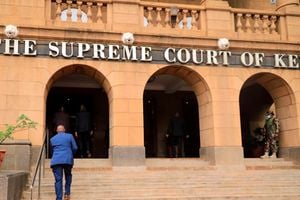
Wawira Njiru is living her dream through Food for Education (Food 4 Education), an initiative that feeds school children.
What are the experiences one needs to have before seeking a gubernatorial post?
There are no standard good experiences. It's the duty of voters to decide if one is competent to serve as a governor. But there is some value in having served in Parliament. This is because Parliament provides a good platform where leaders learn from each other on what are the most impactful programmes that help the people.
This is not to suggest other experiences outside Parliament are inferior. Take for instance Salim Mvurya, the former Kwale governor. His non-governmental organisation experiences prior to joining politics made him one of the most impactful county leaders.
However, Parliament has this culture of members whiling away time at the lounge and in the process, serious and impactful information get shared in this informal congenial atmosphere.
It is through whispers on this fora I got to better know Wawira Njiru. I had seen stories in the media of a young lady providing lunch for school going children in Dagoretti. I, therefore, inquired about the project from Dagoretti South MP ‘KJ’ Kiarie.
He said Wawira ran an NGO known as Food For Education. She builds kitchens and sells food to schoolgoing children at subsidised rates. Children pay for the lunch from wrist bands embedded with a chip that enables M-Pesa transactions.
He mentioned spirited resistance from some stakeholders who traditionally overpriced their food deliveries. Wawira’s food cost Sh10 per plate per day.
The payment was convenient and the diet better. KJ explained his role was just to use National Government Constituency Development Fund to construct kitchens and use his political goodwill to mobilise schools to embrace the idea. Wawira’s programme was at the time only available in Ruiru and Dagoretti. But she was exploring extending to Kisumu and Kiambu Town constituency where then area MP Jude Njomo got the idea from KJ.

Founder and Executive Director of Food4Education Wawira Njiru. The UNON will today honour her as UN Person of the Year 2021, for providing free meals to public school children.
On winning the Murang’a gubernatorial post, we sought out Wawira. We proposed an Early Childhood Development Education school feeding initiative but unlike Dagoretti and Ruiru, Murang’a parents would not co-pay as the county would foot the entire bill.
But Murang’a had unique challenges. First, it is a rural county with distances between schools being great and there were many education institutions as well — about 700. In Ruiru and Dagoretti, schools were one or two kilometres apart and also, there were fewer institutions — about 15 per constituency.
Second, Ruiru and Dagoretti roads were paved on a flat surface. In Murang’a, it typically involves transportation of food over hills and valleys.
Third, the sheer numbers of pupils to be fed (42,000) in Murang’a posed logistical challenges. Ruiru and Dagoretti programmes fed about 5,000 learners.
Finally, how to get stakeholders to “buy-in” was a headache. Parents and teachers were worried about the quality and safety of transported food. Stakeholders who were benefiting from status quo where parents paid Sh25 per cup of porridge resisted.
Wawira and her team plus the county team got deliberating. It was decided her organisation would fund a pilot project in select wards at a cost of Sh20 million. That would enable a rational costing of the price of one cup of porridge to be determined. The pilot would unmask the impact of logistical challenges of the programme and that would address challenges 1,2,3...
Challenge number 4 needed political acumen. It was decided we first get leaders to buy-in, especially members of the county assembly through training. A motion was even deliberated on the floor of the assembly to consent to the programme. Thereafter, buy-in of parents was obtained through “uji champions” — democratically elected parents representatives of each ECDE centre.
The county also held public barazas to educate citizens on the programme. The fact that ours was a new government still enjoying political honeymoon was good: the public was ready to give us benefit of doubt.
Uji champions’ role would be to clean utensils and break the seal inserted in the food basket to ensure food safety before pupils consume porridge.
With costing having been done and public/leaders support garnered, the county rolled out the programme, officiated by President William Ruto. It has been one year since Murang’a successfully launched it.
The numbers of ECDE learners has shot up. Teachers report better motivated and attentive learners. It has created jobs for cooks, riders, uji champions. And it is a very cheap programme notwithstanding it's impact. The county expends Sh13 per cup whereas the market price is now about Sh25. Wawira’s organisation subsidises that and county pays the rest. And the county is not bogged down by any logistics — Wawira and her team shoulder all that.
There are many benefits for the farmers who supply her food chain and the agro processors.
The programme has become so effective. Such an initiative can be rolled out in the entire country and we ensure every Kenyan pupil gets food. At least Sh50 billion would be enough. That would boost the school attendance ratio and address malnutrition.
Some counties have visited Murang’a to benchmark while Nakuru, Mombasa and Nairobi have embraced Wawira’s silent food revolution.
That is why I happily appeared on a Zoom interview by the panel considering Wawira for the Elevate Prize Award two months ago to testify on her work.
I am glad she won and got Sh48 million to fund her activities. Kenya needs such brains and that work behind the scenes for the betterment of this country.
And by the way, she is thoroughly apolitical.
But when one looks at her age and what she has achieved, one wishes Kenya has many more persons like Wawira Njiru.
- Dr Kang’ata is the Murang’a County governor; Email: [email protected]













